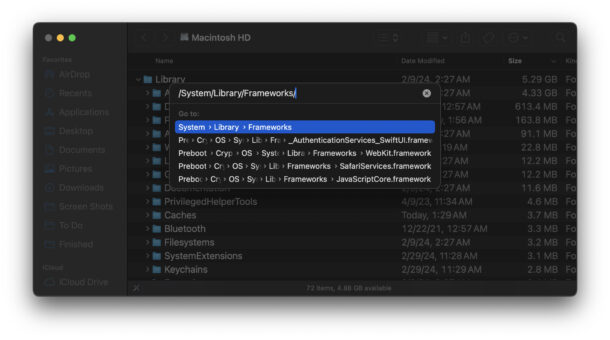6 Helpful Mac Keyboard Shortcut Tips

If you are a Mac user, you might be interested in some specific keyboard shortcuts tricks that can make your MacOS computing experience more efficient and maybe even be more productive too.
Here are six useful Mac keyboard shortcut tips that will improve most people’s MacOS experience, usage, and workflow.
1: Use Spotlight Keystrokes to Launch Apps & Files
Spotlight is the powerful search engine that indexes everything on your Mac, but it can also be used as a super fast way to launch your apps and documents.
Activate Spotlight by pressing Command + Space bar

Type the app name or document name that you want to launch, and then hit Return to directly open the specified app or file.
2: Use Command+Tab to Switch Mac Apps
Press Command+Tab and you’ll instantly bring up an app switcher, letting you quickly flip between open apps by selecting the app icon.

The App Switcher is interactive too, you can select an app by tabbing to it, then press the Q, to quit that app.
3: Use Go To Folder to Jump Around the Filesystem
In the Finder, you can instantly jump to any folder or directory path, and navigate complex directory structures, easily with Go To Folder.
From the Finder, press Command+Shift+G to bring up Go To Folder.

If you have the path to a directory, enter it and hit Return to instantly jump to that folder or directory in the Finder.
4: Force Quit Apps with a Keystroke
Pressing Command+Option+Escape will bring up the Force Quit menu on MacOS, and if an app ever freezes or becomes unresponsive, force quitting an app can be necessary.

Often you can force quit out of the app and then relaunch it to resolve whatever the issue was that caused the app to freeze in the first place.
5: Take Apps In or Out of Full Screen Mode
Sometimes you just need to focus on a single app and don’t want all the distractions. Or maybe you simply prefer full screen apps.
Command+Control+F will enter into Full Screen Mode for Mac apps.

The same keyboard shortcut will also exit out of Full Screen Mode for most Mac apps.
6: Take a Screenshot
Want to take a screenshot of what’s on the Mac screen?
Press Command+Shift+3 to take a screenshot of exactly what is currently on the Mac screen.
The screenshot file then ends up on your desktop, where you can use it however you’d like.
If you take a ton of screenshots on your Mac, then this is just the beginning, you might want to read more keystrokes for taking screenshots including additional keyboard shortcuts to trigger different screenshot features.
–
What do you think of these keyboard shortcuts? Do you have any that you use frequently that you feel others would benefit from knowing? Share your own favorite keystrokes and thoughts on this article down below in the comments.


While using the Command-Shift-4 screenshot command, sometimes pressing and holding down the spacebar is really helpful: it lets you move the whole selection area you’re in the process of defining, and you can still resize it, all before “letting go” to take the actual screenshot. Thus you can fine-tune both the dimensions and the position on your monitor simultaneously.
An addition to the Command and Shift and 4 action you may move the cropping top left of the window by holding down space key.
An addition to the Command+Shift+4 action you may move the cropping top left of the window by holding down space key.
I use Command+Shift+4 to crop a screen shot, unless I need the whole page this gives you a cleaner picture
Yep, that is what I use too!
It’s also useful to capture a single window’s contents (mouse pointer to window, then hit space bar).